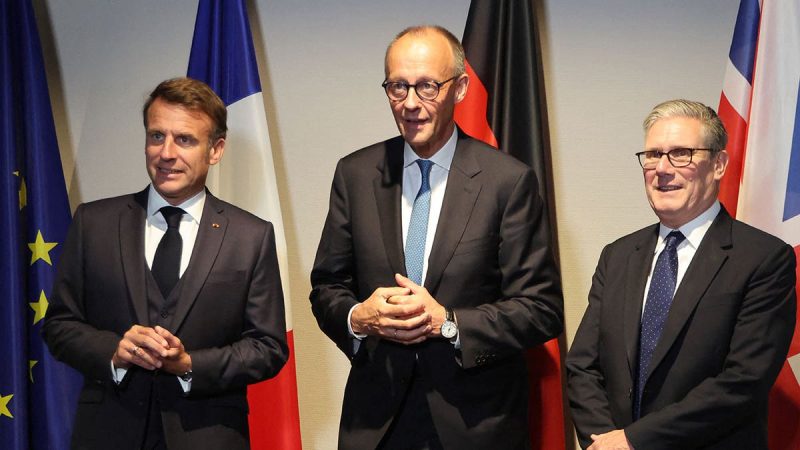Europe’s powerhouse trio, the U.K., France, and Germany (E3), on Thursday initiated the process to reimpose sweeping sanctions against Iran over its ‘significant non-compliance’ with international nuclear agreements.
At 9 am EST, they submitted a letter to the president of the United Nations Security Council, Panama’s Ambassador Eloy Alfaro de Alba, notifying him of their intent to trigger the snapback sanctions mechanism enshrined under the 2015 nuclear deal known as the Joint Comprehensive Plan of Action (JCPOA).
The action comes after months of warnings from European leaders, and years of calls from the U.S. dating back to the first Trump administration in 2018, flagging that Tehran was in violation of nuclear agreements made under the 2015 Joint Comprehensive Plan of Action (JCPOA) – though Iran’s record of non-compliance did not initiate until 2019 per findings by international nuclear watchdogs.
According to a U.K. official on Thursday, the decision to enforce snapback sanctions, which is expected to have severe consequences for Iran’s already flagging economy, was not a decision that was made ‘lightly.’
The official confirmed that there has been ‘very intense diplomacy’ over the last ’12-months, 6-months, 6-weeks’ that ultimately led to this decision – including three major factors like Tehran’s uranium stockpile levels, its operating of advanced centrifuges and its refusal to adhere to international inspection regulations – all of which are dictated under the JCPOA.
The official confirmed that in May Iran was found to have roughly 20,000 lbs of enriched uranium, including 900 lbs of near-weapons grade highly enriched uranium (HEU) – which is 45 times higher than the JCPOA limit of under 660 lbs of enriched uranium.
‘Iran is the only non-nuclear weapons state producing highly enriched uranium,’ the official said, adding that those stockpiles remain unaccounted for.
Thursday’s actions mean that by the end of the 30-day period all 15 members of the United Nations Security Council (UNSC), which includes Russia and China, could be legally bound to reimpose sanctions on Iran.
But in speaking to reporters in Washington, D.C. on Wednesday, the head of the U.N.’s nuclear watchdog, the International Atomic Energy Agency, said there is ‘still time’ for Iran to prevent the sanctions from taking hold.
‘Iran will have to comply,’ IAEA Director General Raffael Grossi said. ‘I think there is a possibility. I’m not naively optimistic, but at the same time, there is no reason why we should not [have] a good outcome.’
The E3 and the U.S. have made clear there are specific steps that Tehran needs to do in order to avoid snapback sanctions, including giving the IAEA full access to all Iranian nuclear sites, direct negotiations with Washington, and accounting for roughly 900 lbs of highly enriched uranium (HEU).
But Grossi also noted that it would be ‘almost impossible’ for Iran to get to a point of compliance with the JCPOA due to too many technical advances.
Questions over the location of the HEU, which is estimated to be enough to make 10 nuclear warheads, mounted after the U.S. levied direct strikes at Iran’s nuclear program in June. Reports suggested that in the days leading up to the strikes, Iran may have moved and hidden some of its uranium based on satellite imagery that showed convoys leaving the Fordow and Isfahan nuclear sites.
But on Wednesday, Grossi countered these concerns and said the IAEA had no evidence that the uranium has been moved to a secret location.
Though the stockpile of HEU is still not officially accounted for as the IAEA has not been granted access to Iran’s top nuclear sites – though Grossi said he anticipated that access to come shortly as inspectors on Wednesday visited the Bushehr nuclear power plant after being re-granted access in Iran.
When asked by reporters whether Iran was taking immediate action to begin meeting the E3 demands and avoid sanctions, Grossi said, ‘point blank…no.’
‘Our work hasn’t started. We are not yet where I would like us to be – I will not hide this,’ he said. ‘But at the same time I am a diplomat, I am always working towards peace.’
Iran has threatened to retaliate if the sanctions are implemented, though how it will do so remains unclear.
Tehran in recent years has strengthened ties with powerful allies like Russia and China, who have rejected calls for snapback sanctions.
But even though Russia and China sit on the U.N. Security Council with veto powers, they will not be able to unilaterally stop the sanctions from going through.
In an unprecedented move in 2015, the sanctions mechanism was written in a way that reversed standard council procedure, which would traditionally require all five permanent members to approve of any action, meaning that just one veto could block the action.
In the case of snapback sanctions on Iran, every permanent member, which includes the U.S., France, U.K., China and Russia, must veto the push to reimpose sanctions.
This means that, despite opposition from Russia and China, they cannot block the sanctions, as they have increasingly done when it comes to other security council actions in recent years – leading to what some have argued is a paralyzed state in the U.N.’s highest body.
SCOOP: Ilhan Omar hit with House Ethics complaint over response to Charlie Kirk’s assassination
House Main Street Caucus Chairman Mike Flood, R-Neb., will refer Democratic colleague Rep.…















